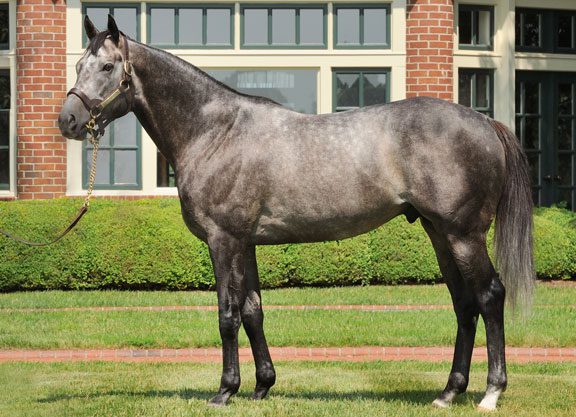By Bill Oppenheim
Fasig-Tipton took a risk this year by cataloguing 26% more yearlings between their Fasig July and Saratoga yearling sales, since the usual pattern when catalogues are increased so much is for the not-sold percentage to rise, the gross to stay about the same, and the average to drop. But it was all smiles at Saratoga Tuesday night after Fasig's flagship yearling sale saw 27% more horses sold than last year, with a whopping 40% increase in gross, to $46 million, an actual drop in the not-sold percentage from 19% to 15%, and a 10% increase in average, to $332,448. It was the highest gross at Saratoga since 2009, when receipts topped $52 million, but they plunged to $32 million the next year, and had not risen above last year's $33-million gross since. So this was a huge sale.
With the New York-bred sale (big increases in number catalogued here too) scheduled for this weekend, and with their first two sales in the books, Fasig July and Saratoga combined sold 350 yearlings, an increase of 26% from last year. Receipts for the two sales totaled $66,760,000 (see the Weekly Sales Ticker), a 37% increase–over $18 million–from last year, and even the average has increased 8% for the two sales combined, to $190,703. No wonder Fasig officials are smiling. Of course, this is also good news not just for this weekend's sale, but also for next month's marathon, the Keeneland September sale. Demand is high; there is money around. Good news for breeders and consignors.
When just 145 horses sell, it's difficult for trends to be established on too many sires. Only 11 stallions had five or more sell this week, yet there were a couple of significant commercial moves. Gainesway's Tapit was of course leading sire on average, with seven Tapits averaging $885,714 (Saratoga only). Spendthrift's Malibu Moon was second, with five averaging $517,000. Ashford's Scat Daddy, who had six
yearlings average $450,000, ranking him third with 5+ sold at Saratoga, was the first significant commercial mover. He's been working his way through the ranks, both in performance and commercial terms, and this week's sale marked his entry into the commercial major leagues. Last year, Scat Daddy had 86 yearlings sell for an average of $122,562; this year so far (including Fasig July) he's had nine sell, for an average of $388,333. Of course he's not going to keep that average up in September, but Scat Daddy's yearlings will definitely average a lot more than $122,000 this year. He currently sits second on the North American 2-Year-Old Sire List (click here), with 11 two-year-old winners so far this year, including Royal Ascot G2 Queen Mary S. winner Acapulco.
The second significant commercial mover was Lane's End's The Factor, whose six yearlings (bred on a $15,000 stud fee) averaged $388,667, ahead of two other very promising first-year sires, WinStar's Bodemeister (eight averaged $328,125) and another Lane's End stallion, Union Rags (six averaged $240,000). A $250,000 Barretts 2-year-old, trained by Bob Baffert for Fog City Stable and George Bolton and from War Front's first crop, The Factor broke his maiden at six furlongs in his second start, running a gaudy Beyer 108, and went on to win four Grade I or Grade II races at seven furlongs in California (three dirt, one synthetic), as well as leading wire-to-wire to win the GII Rebel S. at Oaklawn Park at 1 1/16 miles, by 6 1/4 lengths. But seven furlongs was really his game, it turned out. He's always had a little bit of a commercial following, but this was really impressive.
Besides the top two and the three first-year sires, the other six which had five or more sell at Saratoga were: Darley's Bernardini (5 avg. $346,000); Taylor Made's deceased Unbridled's Song (final crop; five averaged $344,000); WinStar's Speightstown (6/$325,833); Airdire, then WinStar's deceased Harlan's Holiday (final crop; 7/$305,000); and WinStar's Pioneerof the Nile (7/$257,143). Pioneerof The Nile is interesting, in that this is his fourth crop, and the level of mare to which he was bred declined significantly. He didn't have great pedigrees to work with, so for him to average over $250,000 signals he is siring very good individuals. He only has 62 3-year-olds in American Pharoah's crop, and 46 2-year-olds. He's got 99 yearlings, but the pedigrees are not particularly strong, which means this is probably the year to try and buy one.
Not a subscriber? Click here to sign up for the daily PDF or alerts.





